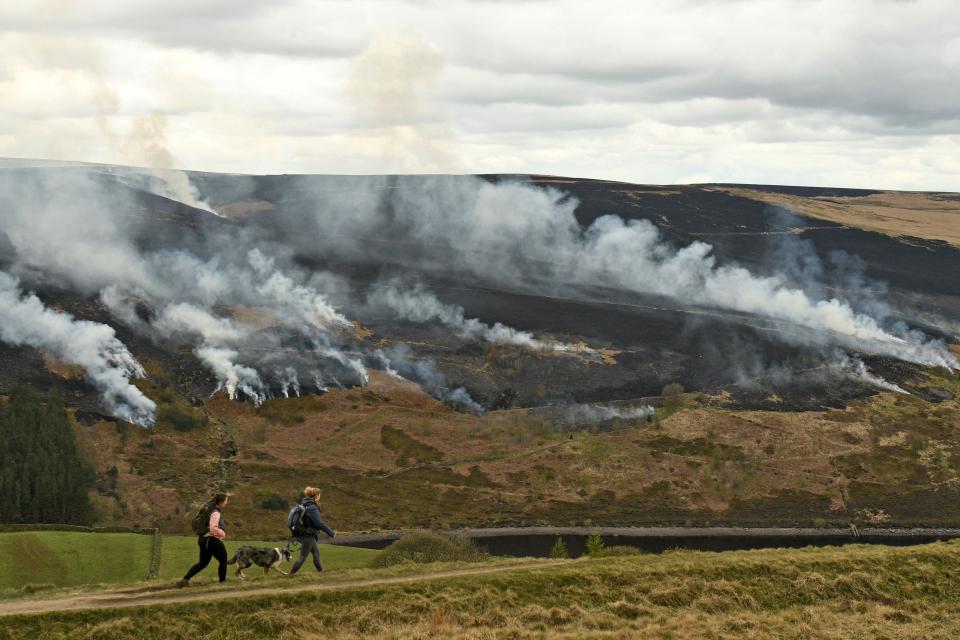Four actions we must take to combat escalating climate impacts, according to government advisers

“Absolutely illogical.” That is how Baroness Brown of Cambridge, from the Climate Change Committee, described the government’s handling of worsening climate impacts on Monday.
Her words came ahead of a stark new report from the country’s independent climate advisers, which warned that the UK is now less prepared for the climate crisis than it was five years ago as a result of government inaction in the face of rising risks.
The 1,500-page report warns of the rising toll of the climate crisis on Britain’s homes, food supply, health systems and economic output.
UK temperatures have already risen by 1.2C since the period 1850 to 1900, while average sea levels have risen by some 16cm. Chances of an extreme heatwave like the one seen in 2018 occurring in any given year are now up to 25 per cent compared to less than 10 per cent a few decades ago.
The need to take action against rising climate risks is greater than ever, say the experts. And many of the adaptation measures on offer would come with co-benefits for people and wildlife, they add. Below, The Independent walks through some of the report’s recommendations for how we can better cope with the rising impacts of the climate crisis.
Retrofitting homes
Britain’s leaky and poorly ventilated homes are not fit to cope with rapidly rising temperatures and worsening extreme weather events, the report warns.
In the last five years, more than 570,000 new, non-heat resilient homes have been built across the country, it says. Retrofitting existing homes with measures such as sunshades and ensuring no new non-heat resilient houses are built must be an immediate priority for the government, the advisers say.
In addition to helping people cope with rising climate impacts, retrofitting homes could also help to tackle the source of the crisis, which is rapidly rising emissions. The UK’s homes currently account for around one-fifth of our total CO2 emissions. Making homes more energy-efficient is one of the key actions that must be taken if the UK is to reach its target of net-zero emissions by 2050, according to the CCC.
Rewilding habitats
Rewilding and protecting Britain’s natural habitats is another key measure that could help Britain cope with rising climate impacts, according to the advisers.
Restoring natural environments such as peatlands and forests could help to provide natural barriers against extreme weather events such as flooding – as well as a space for wildlife and human wellbeing, the report says.
At present, the UK’s natural habitats are in a poor state. A report released in April found that the UK’s forests had reached “crisis point” as a result of habitat damage, pollution and rising temperatures, while scientists have consistently warned that the country’s peatlands are in a highly degraded state following centuries of neglect.
Restoring habitats could also help to tackle rapidly rising emissions. The release of carbon from the country’s degraded peatlands currently causes around 5 per cent of the UK’s total greenhouse gas pollution.

‘Climate-smart’ farming
Rapidly rising temperatures and worsening extreme weather events pose a particular threat to Britain’s farmers, the report says.
To prepare, farmers will need to switch to growing different or new varieties of crops that are more resistant to rising heat and changing rainfall patterns, according to advisers.
Changes to how the land is managed, including through using new technologies for managing water and taking action to improve the health of soils, will also be needed if farmers are to adapt to changing climate conditions, the advisers say.
Preparing for changing weather
Another way the country must adapt is by doing more to prepare for worsening extreme weather events such as heatwaves, flooding and droughts, the report says.
The report recommends that the government bring in more early warning systems to help people prepare for extreme weather events such as flooding.
It also says the UK should invest more in heat alerts and planning for heatwaves. More than 4,000 heat-related deaths have been recorded in England, the report says. And, by 2050, chances of an extreme heatwave occurring in any year could reach 50 per cent.
Read More
UK less prepared for climate crisis now than five years ago, government advisers warn
Greenpeace activist ‘lucky not to have been shot down,’ says German minister
Climate crisis hits French wine — and Europe’s coffee and chocolate supplies could be next

 Yahoo Finance
Yahoo Finance 